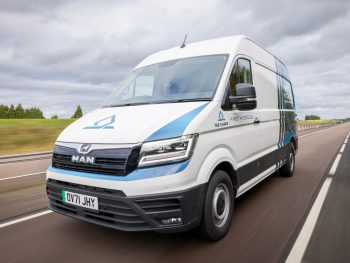A hydrogen fuel cell-powered LCV from First Hydrogen is exceeding expectations, including on driving range, in real-world tests currently underway.

Fleet management provider Rivus has become the inaugural operator to trial the ‘first-of-its-kind’ vehicle, generating performance data that includes information on fuel consumption to reflect different vehicle operating parameters.
The data logged so far supports vehicle range simulations, which exceed a 500km (311-mile) range and the FCEV vehicle is currently performing with excellent efficiency, including both urban, extra urban (which includes driving at higher speeds) and highway operations.
First Hydrogen’s FCEV fuel consumption figures seen in many driving scenarios are under 2kg/100km, and in mostly urban driving this falls to 1.5kg/100km.
The firm said the trial has already shown how hydrogen fuel can provide fleet managers with zero-emission vehicles that deliver the range, payloads and fast refuelling times required.
Initial road tests confirm that the hydrogen powertrain, which has a maximum power of 100kW, is powering the vehicle to continuously run on UK public roads at the maximum speed limit.
Rivus’ drivers are testing the vehicle using different payloads around roads in Birmingham, the West Midlands and South Yorkshire. The trials will also draw direct comparisons between battery electric and diesel- or petrol-powered vehicles.
Onboard telematics and a GPS tracker upload vehicle data to the cloud, providing First Hydrogen’s engineers with close to real-time analysis.
The vehicle is also fitted with safety and security features that enable its location to be monitored and ensure the vehicle can be maintained when required. There is also reporting technology on board, so drivers and fleet managers can keep track of refuelling frequency and record any damage or road incidents that may occur.
It’s the first in a series of operator trials that will continue for the rest of the year with other blue-chip UK-based fleets; all of which are members of the UK Aggregated Hydrogen Freight Association (AHFC).
The trials are being used to inform development of First Hydrogen’s Generation II series, currently in development, and will help optimise vehicle configuration and enhance Total Cost of Ownership (TCO) data.
But the trials also enable fleet operators to evaluate fuel cell electric vehicles alongside their own fleets in real-world operations, assessing the merits of FCEVS for potential future use.
Steve Gill, CEO of First Hydrogen Automotive, said: “We’re thrilled that initial road testing has shown that the vehicle is not only meeting performance requirements but exceeding the early expectations we set for real-world driving. The efficient fuel consumption means that our vehicle can go further on a single tank of fuel. This will save drivers time with fewer refuelling stops and lower running costs, reducing total cost of ownership, which will make our LCVs more attractive to fleet operators and potential customers.”

